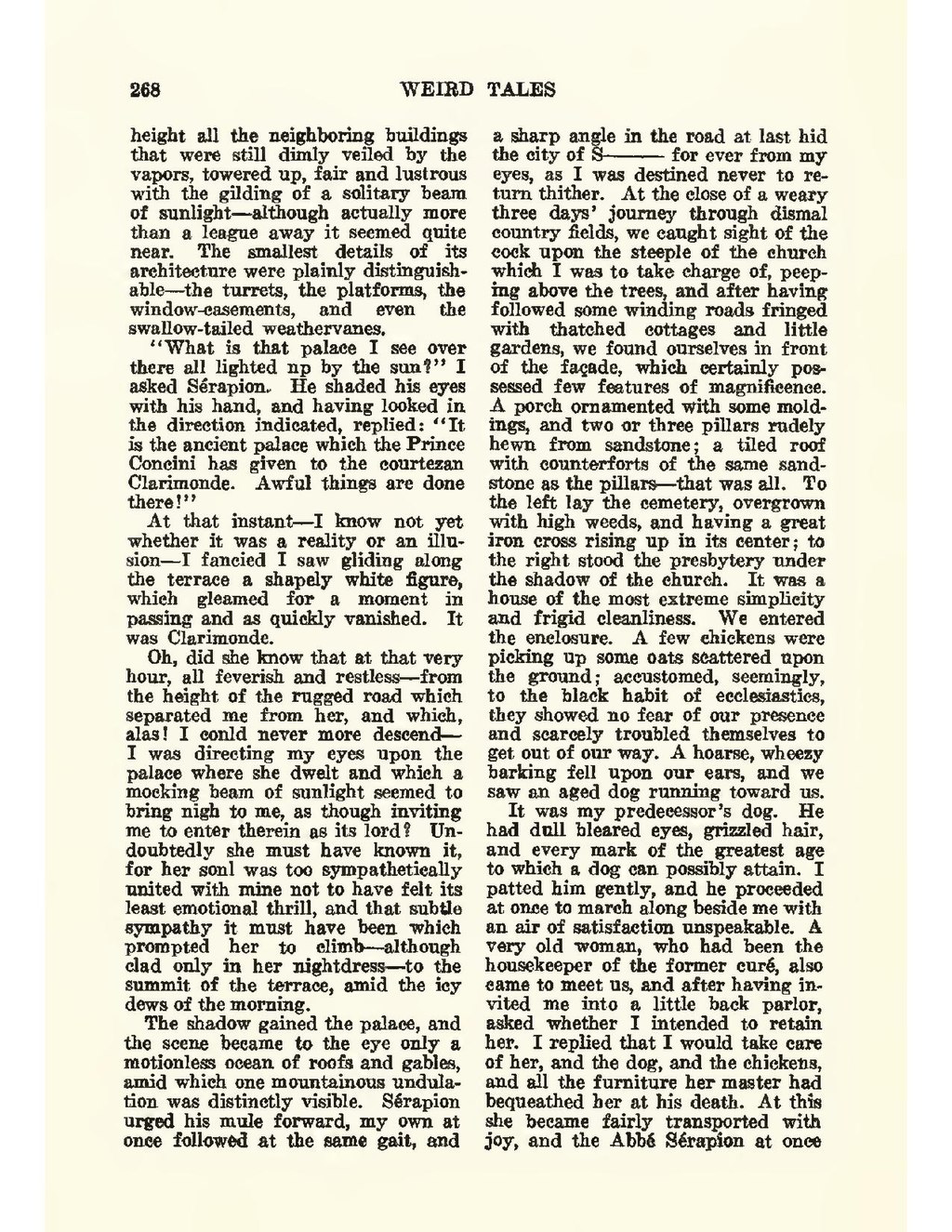height all the neighboring buildings that were still dimly veiled by the vapors, towered up, fair and lustrous with the gilding of a solitary beam of sunlight—although actually more than a league away it seemed quite near. The smallest details of its architecture were plainly distinguishable—the turrets, the platforms, the window-casements, and even the swallow-tailed weathervanes.
"What is that palace I see over there all lighted up by the sun?" I asked Sérapion. He shaded his eyes with his hand, and having looked in the direction indicated, replied: "It is the ancient palace which the Prince Concini has given to the courtezan Clarimonde. Awful things are done there!"
At that instant—I know not yet whether it was a reality or an illusion—I fancied I saw gliding along the terrace a shapely white figure, which gleamed for a moment in passing and as quickly vanished. It was Clarimonde.
Oh, did she know that at that very hour, all feverish and restless—from the height of the rugged road which separated me from her, and which, alas! I could never more descend—I was directing my eyes upon the palace where she dwelt and which a mocking beam of sunlight seemed to bring nigh to me, as though inviting me to enter therein as its lord? Undoubtedly she must have known it, for her soul was too sympathetically united with mine not to have felt its least emotional thrill, and that subtle sympathy it must have been which prompted her to climb—although clad only in her nightdress—to the summit of the terrace, amid the icy dews of the morning.
The shadow gained the palace, and the scene became to the eye only a motionless ocean of roofs and gables, amid which one mountainous undulation was distinctly visible. Sérapion urged his mule forward, my own at once followed at the same gait, and a sharp angle in the road at last hid the city of S for ever from my eyes, as I was destined never to return thither. At the close of a weary three days' journey through dismal country fields, we caught sight of the cock upon the steeple of the church which I was to take charge of, peeping above the trees, and after having followed some winding roads fringed with thatched cottages and little gardens, we found ourselves in front of the facade, which certainly possessed few features of magnificence. A porch ornamented With some moldings, and two or three pillars rudely hewn from sandstone; a tiled roof with counterforts of the same sandstone as the pillars—that was all. To the left lay the cemetery, overgrown with high weeds, and having a great iron cross rising up in its center; to the right stood the presbytery under the shadow of the church. It was a house of the most extreme simplicity and frigid cleanliness. We entered the enclosure. A few chickens were picking up some oats scattered upon the ground; accustomed, seemingly, to the black habit of ecclesiastics, they showed no fear of our presence and scarcely troubled themselves to get out of our way. A hoarse, wheezy barking fell upon our ears, and we saw an aged dog running toward us.
It was my predecessor's dog. He had dull bleared eyes, grizzled hair, and every mark of the greatest age to which a dog can possibly attain. I patted him gently, and he proceeded at once to march along beside me with an air of satisfaction unspeakable. A very old woman, who had been the housekeeper of the former curé, also came to meet us, and after having invited me into a little back parlor, asked whether I intended to retain her. I replied that I would take care of her, and the dog, and the chickens, and all the furniture her master had bequeathed her at his death. At this she became fairly transported with joy, and the Abbé Sérapion at once
